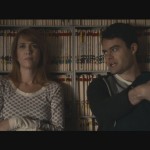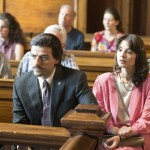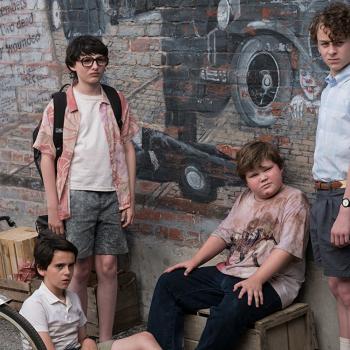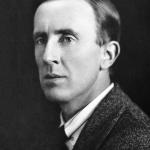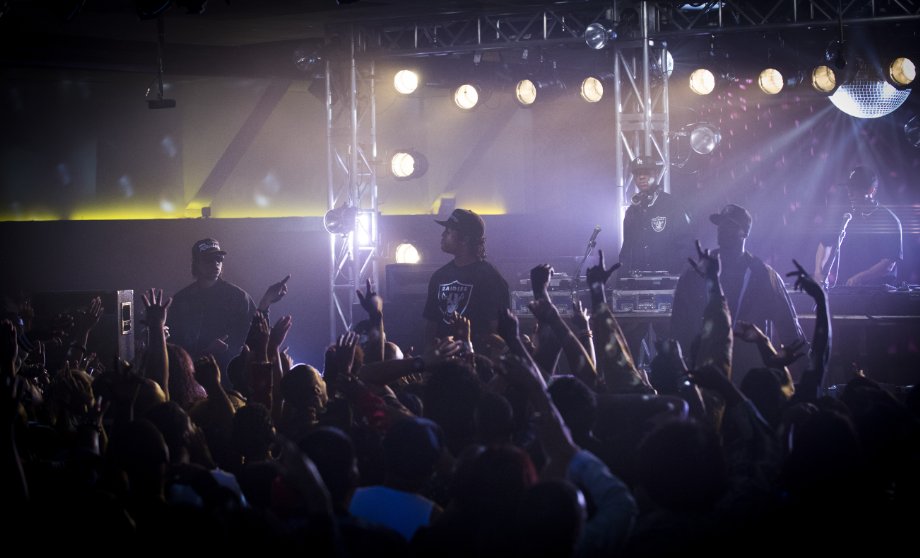
I went to Straight Outta Compton (directed by F. Gary Gray) this week because I wanted to understand. The world of gangsta rappers N.W.A. could not be more removed from my own experience. But their indignation at police brutality (though expressed with its own brutality) seemed timely. I wanted to let the film help me understand the human beings behind the angry lyrics.
N.W.A. was one of the most important West Coast/gangsta rap groups of the 1980s and ’90s; it was made up of Dr. Dre, Eazy-E, Ice Cube, DJ Yella, and MC Ren. The group’s debut album, Straight Outta Compton (meaning their inner city hometown of Compton, CA) is the source of the film’s title.
At the heart of the Straight Outta Compton are countless acts of police brutality and harassment–but most of all, the Rodney King beating by police officers in the early ’90s. I was a preteen at the time and starting to become conscious of what was happening in the news. I remember feeling that the police were unjust but also feeling indignant at the riots that followed. While the riots were indeed inexcusable, I don’t think I understood at the time how deeply frustrated, disempowered, and without hope the black community in Los Angeles was. Seeing this history through the eyes of recent events changes my reaction to it.
Now, years later when videos of police brutality against the black community come out regularly, I have come to understand that King’s beating was not an isolated incident. It was a pattern and it had just been caught on tape–finally. And red-hot rage rose up came when the information was clear, but justice was still not served. The rage came from total distrust in the system to bring justice. It was a rage of trapped people, broken and in despair. The depiction of police violence in the film is its strongest point. It’s important for those of us who did not grow up in the world to understand the experience of an entire segment of our population and the way that it (along with other factors) creates an environment in which hope is difficult to find.
X X X X X
Hip hop music is one of the most innovative art forms ever conceived in America. Taking pieces of music, sampling them, and creating wholly unique rhythms on a turntable is an amazing act of creation and musical genius. The hip hop artists are the poets of their generation. They often have conviction and insight to share. But like any art form, hip hop can be turned to the crass and denigrating. Music can ennoble us, but it can also lead us down the rabbit hole into deeper darkness.
Sometimes darkness is needed. Darkness that calls attention to hard truth is necessary. N.W.A. claimed, “Our art is a reflection of our reality. What do you see when you go out your door?” And sometimes that was true. Sometimes, the visceral and real flowed through the lyrics, pointing to the pain of the disenfranchised. But all too often (at least in the film) there was pointed truth about everyone except the artists. This led to a skewed view of reality and a glamorization of and obsession with the elevation of the self.
In N.W.A.’s perhaps most famous anthem, “F— the Police,” there are elements of truth. There is recognition of the police state in which the inner city lived, and there is the recognition that even when one tries to do what is right, one is pre-judged. We have seen this story over and over again in the news lately: even upstanding black citizens or those who are attempting to cooperate with police can be misjudged and even end up dead at the end of the day. Overreaction is likely when it comes to our black citizens, particularly black young men. The rage that builds when justice is lacking is wholly understandable.
I went to see this movie because I wanted to empathize with those who lack hope because of oppression. I went with an open mind and even gave the film several days to settle in my mind. But at the end of the day, however much I empathize with the pain and despair of inner city youth, I found myself weighed down with the darkness of the film. It was not just the darkness of the police occupation and the injustice of authorities; that was half of the darkness. But the other half was that the men in the film sought “liberation” in such dark and oppressive ways. While I know it would be hard to have a vision for something more hopeful and noble in the midst of the conditions and hopelessness in which they lived, I still was left longing for them to rise above the lower things of violence, posturing, and misogyny, and use their considerable musical talent to uplift their community. I can’t ultimately condemn men who are angry because of what my own people helped to institute, but I also can’t celebrate what they turned to either.
The film’s greatest flaw is a minimal use of a self-critical eye. This was almost inevitable since N.W.A.’s Ice Cube and Dr. Dre were two of the film’s producers. Consequently, the film tries to lionize its subjects, but since there is not much noble to draw on, it leads to disjointed storytelling. We are supposed to admire the subjects, but they behave poorly oftentimes, sleeping with countless groupies, treating women with disrespect, engaging in countless feuds with one another; at one point, one of the DJs even destroys his manager’s office. He’s understandably deeply frustrated at the time, but the outburst is not unlike the tantrum of an angry child.
But most telling of all is the downplaying of the group’s problem with domestic violence.

